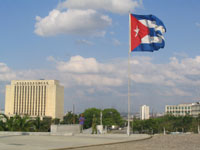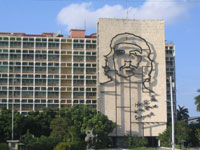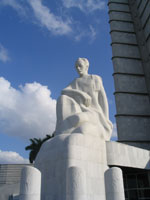Hello from Cuba (14) - Field Trips and Interviews
Hotel Habana Libre, Thursday, April 14, 2005, 3:38 pm
During the past close to 2 weeks, I have really been trying
to understand Cuba, its politics, its economy, its people,
its mentality. I have been talking to as many locals as I
could, and every night before I go to bed, I have been reading
books about Cuba in addition to having purchased some local
Cuban books which are going to give me more insight about
this unique, contradictory place.

Cuban flag, Plaza de la Revolucion
Yesterday I had a chance to talk to a TV journalist, who is
a specialist in economics and he explained a few things to
me. I only have a passing degree of familiarity with Communism,
mostly from my time back home in Austria, when the Soviet
Block still existed. It's so hard for me to believe that virtually
all business activity here is state-owned and state-run. The
journalist explained to me that there are 140 occupations
(e.g. private small restaurants / "Paladares", private bed
and breakfasts or "Casas Particulares", taxi drivers, carpenters,
plumbers, artisans and other tradespeople, that are allowed
to practice private enterprise while all the stores, service
providers and industry are nationalized.
Not surprisingly, the quality of service is very low and people
steal incredible amounts of goods and merchandise from the
State to resell them privately on the street. I asked the
journalist what he thinks the percentage of theft is in comparison
to the total gross national product, but he played pretty
dumb and said he couldn't give me an answer to that question.
Apparently the huge amount of theft and resulting private
enterprise is not officially discussed in Cuban political
circles.

Che immortalized on the Plaza de la Revolucion
At noon today I went for a walk with a local Cuban woman from
the university and we tried to grab a simple lunch. We tried
4 restaurants, all of them were closed (some apparently due
to a shortage of water) and the ones that were open, only
had a couple of the items that were listed on the menu. We
finally ended up eating a pizza at one of the big hotels.
Long lineups and shortages are a theme that repeats itself
daily several times.
Earlier today my language class (the professor and 4 students)
went on a field trip to the "Center Felix Varela", a non-governmental
organization, funded by Swiss, Belgian and Canadian contributors,
that concerns itself with 4 main topics: sustainable development,
conditions for peace, local community development and environmental
education. From what I understand, they provide workshops,
seminars and conference for academics and political decision
makers in these 4 categories of topics and they have more
than 100 volunteers who go out into society to apply some
of these principles.
Again, this is one of the idiosynracies of Cuba: it's a third
world country with major economic problems, often lacking
the basic necessities. But on the other hand, there are organizations
that concern themselves with advanced societal issues such
as sustainable development, the environment, etc.

Plaza de la Revolucion
Admittedly Cuba is not doing very well yet in these regards.
Environmental conscience is in its infancy, recycling doesn't
exist and people freely toss garbage into the street or the
ocean. Sewage treatment does not exist either and Havana's
waste water is apparently discharged without treatment into
Havana Bay. On the other hand, there are organizations that
want to promote the use of alternative energy in Cuba, particularly
of solar energy.
Agriculture in itself is for the most part "organic" since
Cuba doesn't have the money for agricultural machinery, fertilizers
or other chemicals. In many cases fields are still cultivated
with oxens and ploughed manually, which obviously affects
efficiency, but on the other hand provides a healthy natural
crop. Again, one of the many idiosyncracies of this fascinating
country.
I can't help but be mesmerized by this country, which on one
hand is so strangely advanced (in terms of medicine, literacy,
infant mortality, life expectancy, education, etc.), but on
the other it is so immensely backward. Sometimes it is truly
hard to process all the various impressions that at first
glance don't make sense, but after a while you start to realize
that life in Cuba has its own very very strange and unique
characteristics.
Interesting and useful books about Cuba:
Related Articles:
"My
Post-Cuba Reflections: Appreciation and Balance"
"Cuba
is Calling - Why I selected Cuba as my language study destination"
Hello from Cuba (1) -
First Impressions"
"Hello from Cuba (2) - Rain
in Vinales"
"Hello from Cuba (3) - Hiking
Vinales and Exploring Nature"
"Hello from Cuba (4) - Bureaucracy
Galore - The University of Havana"
"Hello from Cuba (5) - Another
Mind-Twisting Experience"
"Hello from Cuba (6) - The
Student Experience and Political Insights"
"Hello from Cuba (7) - Fun
and Recreation"
"Hello from Cuba (8) - Bicycle
Rides, Camellos and Cannon Shots"
"Hello from Cuba (9) - Havana
Neighbourhoods"
"Hello from Cuba (10) - A
Country Excursion"
"Hello from Cuba (11) - Inside
a Cuban Home"
"Hello from Cuba (12) - Contrasts
and Contradictions"
"Hello from Cuba (13) - Exploring
Downtown Havana"
"Hello from Cuba (14) - Field
Trips and Interviews"
"Hello from Cuba (15) - Getting
ready to say 'Goodbye, Havana'..."
"Hello from Cuba (16) - The
final day"













